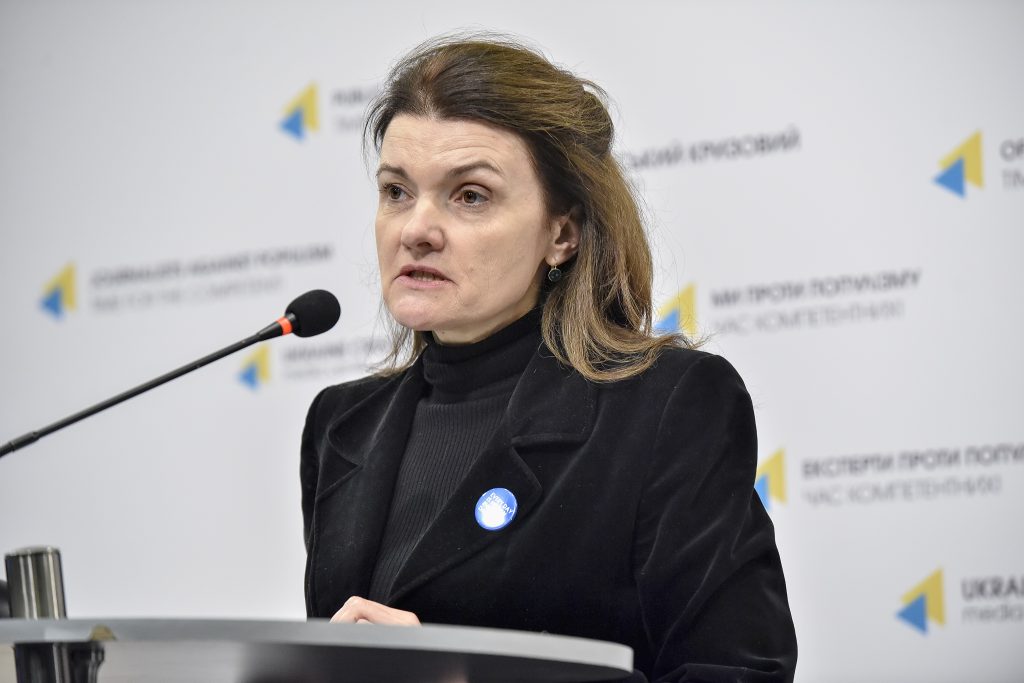Between 16 August and 15 November, 50 civilian casualties were recorded in the armed conflict in the east of the country, including 14 dead and 36 wounded. Fiona Frazer, head of the UN Human Rights Monitoring Mission in Ukraine, reported that it was 52.4% less than during the previous reporting period (mid-May to mid-August of 2018). This data was released in the framework of the 24th report on the human rights situation in Ukraine of the UN Human Rights Monitoring Mission during a briefing at the Ukraine Crisis Media Center. Altogether, since the beginning of the conflict, more than 3,000 civilians were killed, 7,000 to 9,000 were injured, and experts estimate that more than 40,000 homes were destroyed or damaged. “Despite the fact that the number of casualties among the civilian population has decreased, each of them has a human tragedy,” said Fiona Frazer.
Fiona Frazer reminded that the Ukrainian government has not yet developed a comprehensive compensation mechanism for the civilian population. She also spoke about comments to the draft resolution regarding a new procedure for the movement of people and trasfer of goods across the contact line, which were developed with other partners and submitted to the Cabinet of Ministers for consideration. “This resolution should be the only document to regulate movement across the contact line,” said Fiona Frazer. The head of the UN Human Rights Monitoring Mission in Ukraine also urged the deputies to review the bill, which would allow internally displaced pensioners to receive payments without ties to their place of registration, as soon as possible.
In total, during the reporting period, there were 40 violations of human rights on both sides of the contact line. “We document human rights violations throughout Ukraine, including a teritory, controlled by the self-proclaimed Donetsk people’s republic and the self-proclaimed Luhansk people’s republic. During this reporting period, however, we had to step up our remote monitoring of the human rights situation there, as our operations were restricted,” said Fiona Frazer, while pointing out that the Ukrainian side provides full access for monitors to places of detention. She said that very long pre-trial detention in cases of prosecution of crimes against national and public security could be used as an instrument of pressure on the accused, and advised the courts in such cases to refer to the practice of the European Court of Human Rights.
According to Fiona Frazer, from mid-August until mid-November, there was a further increase in the number of attacks on civil society activists, journalists and minority representatives, two of whom – Mykola Bychko and Kateryna Gandzyuk – were killed. “I would like to stress that impunity for crimes emboldens perpetrators, leading to more violence,” said the head of the United Nations Monitoring Mission on Human Rights. Fiona Frazer also noted that the investigation into the murders of the Maidan members is moving too slowly, although there is little progress in one of the cases related to these events. Fiona Frazer added that during the three months 44 violations of human rights by the Russian Federation in the Crimea were recorded. She reported that during this period, 5 Crimean Tatars were convicted of extremism and terrorism.
Fiona Frazer separately commented on the important events in Ukraine that took place after November 15, and specifically called on the Russian Federation to provide members of crews of Ukrainian navy vessels, captured during the conflict in the Kerch straight, regular access to medical care and lawyers. She also appealed to the Ukrainian leadership in order to prevent excessive use of powers in limiting human rights during the martial law, so that such restrictions would be applied only if necessary and in accordance with the law. Regarding the autocephaly of the Ukrainian Orthodox Church, Fiona Frazer called on the duty of the state to protect the rights of citizens regardless of their religious beliefs. She also emphasized that human rights should be a priority during the forthcoming elections.




